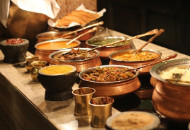The restaurant industry is very important for the Indian economy; for instance, this type of activity represents the third most developed sub-sector of the services industry in India. It represents a large employer and, at the level of 2018-2019, the restaurant industry accounted for a total of 7,3 million employees.
In order to start a business activity as a restaurant, there are numerous procedures that have to be completed and in this sense, investors must know that they have to be prepared to apply for a wide range of business licenses that are imposed to all catering units operating here. With regards to this aspect, our team of specialists in company registration in India can provide an extensive presentation.
What types of licenses are needed for an Indian restaurant?
Regardless if the investors want to register a large or a small restaurant in India, they will be required to apply for the same types of licenses. This is one of the most important steps that have to be met during the procedure of company formation in India; in order to obtain the necessary licenses, various requirements will apply and some of the most common restaurant licenses are the following:
| the FSSAI License | the basic restaurant license, issued by the Food Safety and Standard Authority of India |
| the Liquor License | this is required as long as the restaurant will serve alcoholic beverages in its premises (the document is issued by the Excise Commissioner in the region where the restaurant is registered) |
| the Health Trade License | is imposed under the provisions of the Municipal Corporation Act |
| the Eating House License | it is issued by the Licensing Police Commissioner in the region where the catering unit operates |
Those opening a company in India as a restaurant will need to go through additional procedures; for example, the catering unit must be registered following the requirements established by the Shop and Establishment Act – this is required regardless if the food business is set up as a restaurant or as a mobile catering unit (for example, a food truck). The registration procedures may vary depending on the city where the business operates and our team of specialists in company formation in India can offer tailored advice, based on the Indian region where the company will be set up.
What are the statistics on the restaurant sector in India?
As we presented at the beginning of the article, the Indian restaurant industry is increasing at a steady rate, being a major GDP contributor to the local economy. Besides these, the projections for the next years also show that the restaurant industry will further grow, considering that that the country is characterized by a young population, which prefers to socialize in local or foreign restaurants. Some of the basic information foreign investors should know is presented below:
- it is estimated that by 2024, the foodservice market in India will account for $95,75 billion;
- the value of the quick service restaurants (such as fast foods) is also growing in India – in 2018 it had a value of $1,91 billion;
- in 2010, the average value spent by a customer in a local restaurant stood at $73;
- in 2018, the average value increased at $86, while for 2020, the average spending is estimated at $91;
- the number of visits in Indian restaurants also increased – in 2010, it stood at 4.2 visits, while in 2018, it stood at 5.6 visits.
You may also count on us for consultation services, outsourcing, employee tax management, leave/absence management, and other services when it comes to payroll in India. In order to offer clients all the services they would typically need to have specialized experienced staff for, one of the departments our professionals can handle is accounting.
Our Indian accountant relies on specialized tools to offer efficient and timely solutions. Software is crucial when dealing with accounting and the complex tasks related to it. If you have any questions or would want more information about our services and personalized solutions, don’t hesitate to contact us.
Are there any other requirements for opening an Indian restaurant?
Yes, investors, both local and foreign, are required to perform additional steps in order to open a company in India as a catering unit. For this, the company’s representatives have to address to a local fire department, which must issue a No Objection Certificate, which stipulates that the restaurant is safe from any hazards and that it meets the safety standards that will protect both the customers and the staff in the case of a fire hazard.
If the restaurant will provide music on its premises, the legislation in India stipulates that the owners of the company must also apply for a music license. This is required regardless if the music is played live, by a band, or if the restaurant offers pre-recorded music. The licensing requirements applicable in this case are stipulated under the Copyright Act.
Furthermore, the owners have to make sure that the activities of the restaurant do not negatively impact the environment and in this situation, it is necessary to obtain a Certificate of Environmental Clearance, by submitting a set of documents. It is also compulsory to register for value added tax, which, in India, is known as the GST. The registration of an Indian restaurant is a complex matter and this is why we highly advise foreign businessmen to contact our team of consultants in company formation in India for legal advice.


